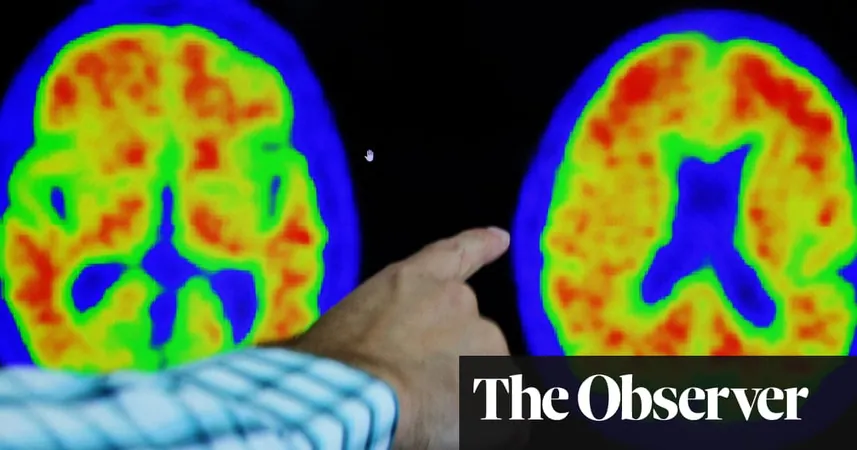
Surprising Link: Can Surviving Cancer Reduce Alzheimer's Risk?
2024-11-16
Author: Kai
Surprising Link: Can Surviving Cancer Reduce Alzheimer's Risk?
As we age, the shadow of serious diseases looms larger, with cancer and Alzheimer’s disease topping the list of health concerns—especially in nations with increasing elderly populations like the UK. Decades ago, researchers at a psychiatric center in New York uncovered an unexpected relationship during autopsies, revealing an intriguing inverse correlation between cancer and Alzheimer's disease.
In a pioneering study published in 2012, Dr. Jane Driver from Brigham and Women’s Hospital in Boston tracked 1,278 participants aged 65 and older over an average of 10 years. The results were striking: cancer survivors had a 33% lower risk of developing Alzheimer’s compared to those without a cancer history. However, this finding sparked debate in the scientific community about the potential for survival bias—did cancer survivors simply not live long enough to develop Alzheimer’s?
Since Dr. Driver’s initial findings, research has intensified, building a stronger case for a protective relationship between surviving cancer and reduced Alzheimer’s risk. The most comprehensive analysis to date came from researchers at Imperial College London in July 2023, which scrutinized NHS health data from over three million citizens aged 60 and above. Their investigations revealed a 25% lower incidence of dementia among cancer survivors, further establishing this inverse correlation across common cancer types like breast, lung, colon, and prostate cancers.
Professor Erin Abner from the University of Kentucky emphasized the persistent nature of these findings, noting, “Despite skepticism, the relationship continues to reappear, confirming that something meaningful is occurring between cancer and Alzheimer’s.” Abner's earlier work provided clinical evidence that cancer survivors exhibited lower amyloid pathology in brain samples, an essential factor linked to Alzheimer’s.
Interestingly, studies suggest the relationship extends beyond just cancer survivors—individuals diagnosed with Alzheimer’s show a reduced likelihood of developing cancer themselves. In her 2012 analysis, Dr. Driver indicated this bidirectionality of risk, a conclusion mirrored in subsequent studies from regions as diverse as Northern Italy and South Korea, where Alzheimer’s patients exhibited a 37% lower risk of overall malignancies.
Despite these counterintuitive results, experts like Elio Riboli of Imperial College London call for further research to decipher the biology behind these observations. One hypothesis points to the role of inflammation in Alzheimer's progression, with the administration of chemotherapy possibly offering some neuroprotective effects due to its anti-inflammatory properties.
Riboli’s team also discovered a genetic profile indicative of increased cancer risk, paradoxically linked to a lower risk for dementia. This points to potential shared biological pathways that could operate inversely in cancer and neurodegenerative diseases. Factors like growth hormones, known for promoting tissue regeneration, may play a dual role, enhancing cellular growth in some environments while setting the stage for tumorigenesis in others.
These unexpected findings shift paradigms and could ignite avenues for new research. For example, the correlation between diabetes and cancer risk questions why diabetic men experience a significantly lowered risk for prostate cancer, a mystery yet to be unraveled.
Undeniably, both cancer and dementia are complex, multifactorial diseases. The interplay between them raises compelling questions reflecting their multifaceted nature. With knowledge still in its infancy, experts like Abner caution against hasty conclusions, insisting that many complexities remain to be addressed, particularly concerning different types of cancer and dementia.
While the present implications of these findings might be speculative, they provide a glimmer of hope for cancer survivors. Could this unique relationship herald a slightly easier road ahead for them? Only time will tell as the research continues to unfold, potentially leading us to new preventive measures or treatments for both cancer and neurodegenerative diseases. The world watches eagerly as science unveils more of these intricate connections!

 Brasil (PT)
Brasil (PT)
 Canada (EN)
Canada (EN)
 Chile (ES)
Chile (ES)
 España (ES)
España (ES)
 France (FR)
France (FR)
 Hong Kong (EN)
Hong Kong (EN)
 Italia (IT)
Italia (IT)
 日本 (JA)
日本 (JA)
 Magyarország (HU)
Magyarország (HU)
 Norge (NO)
Norge (NO)
 Polska (PL)
Polska (PL)
 Schweiz (DE)
Schweiz (DE)
 Singapore (EN)
Singapore (EN)
 Sverige (SV)
Sverige (SV)
 Suomi (FI)
Suomi (FI)
 Türkiye (TR)
Türkiye (TR)